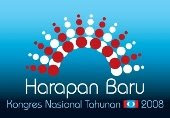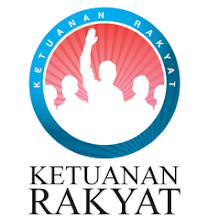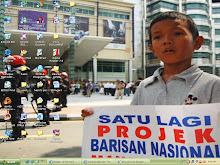
Lim Guan Eng amat dibenci oleh UMNO kerana beliau Mendedahkan Persundalan yang bersarang di dalam kepimpinan UMNO malaysia..
Malaysian Dream from Kajang Prison
by Lim Guan Eng
(January 12, 1999) Malaysian opposition politican Lim Guan Eng was convicted last April of sedition for criticizing the way Malaysian judiciary officials handled a rape case. Lim was arrested in 1995 for promoting “disaffection with the administration of justice in Malaysia.” He had questioned the government’s decision not to press statutory rape charges against a Malaysian politician for having sex with a 15-year-old girl while holding the girl in protective custody for three years. (For more information about Lim’s case, read DFN’s analysis, Malaysian reformers.)
Lim’s imprisonment shows the great lengths to which Malaysian Prime Minister Mahathir Mohamed’s government will go to silence opposition. Anwar Ibrahim, former deputy prime minister and now an outspoken critic of Mahathir, faces sex and corruption charges; Anwar says the charges were trumped up to silence him.
On his 38th birthday, Lim released a letter from prison. This letter, published below, describes ten freedoms that he believes Malaysia needs for democracy. These freedoms include “freedom from inequality… and…selective prosecutions,” “freedom of religion,” and “freedom of telecommunications.” Lim Guan Eng will probably have to wait some time before he can enjoy these freedoms; his latest appeals to overturn his conviction have failed.
--------------------------------------------------------------------------------
These last 108 days have been a most trying and difficult period for me. The enforced separation from my family and loved ones has been as painful for them as it is for me. The loss of personal freedom is equally devastating.
But the physical, emotional and mental sufferings I had to endure was quite unexpected. It has been said that the greatness of a nation is measured not by how well the rich lives but how the poor, down-trodden and oppressed are treated in the slums and prisons. If we use such a yardstick, then Malaysia clearly does not come out very well.
Only prayers, the support and love of my family, the solidarity of Malaysians who demonstrated their love for truth, justice and fair play by signing the signature petition seeking my pardon, have sustained me throughout these challenging times.
It is soul-destroying for a man to be thrown into prison and treated like a common criminal for a crime he did not commit nor even considered as constituting a crime. Only my abiding and unshaken faith that I had tried to do right, correct injustice and uphold the truth enabled me to maintain a sense balance and proportion to face all the daily rigours, indignities and humiliations of prison life as a common criminal.
Regardless of what the courts said, I believe I am no criminal when all I did was try to held Puan Pendek binti Ahmad, a poor old and illiterate lady to seek justice for her granddaughter. I harmed no one when I questioned why the police detained the statutory rape victim but not her rapists.
I know I harmed no one when I questioned the Attorney-General why this rape victim, who as an underaged girl was treated like an offender with her sexual background publicly exposed and her reputation sullied.
I know I harmed no one when I questioned why her rapists were not sentenced to a single day’s jail for rape when they had pleaded guilty to statutory rape.
I know I harmed no one when I demanded that women’s rights be respected, not violated, so that rape victims are protected instead of being punished and rapists imprisoned instead of being set free.
I harmed no one when I criticised the Attorney-General and the police for only prosecuting 14 men (who were merely bound over by the court after pleading guilty) but not a senior politician, when the girl had admitted to the police that all of them had had sex with her.
Perhaps, the only persons I harmed were the girl’s rapists. The irony is that all the rapists need not spend a single day in prison whilst the girl was detained for almost three years and I am sentenced to three years’ jail.
Is this the type of Malaysian justice that the Prime Minister, the Attorney-General and the police are proud of? How then can our sisters and daughters be safe?
But then again, as a Member of Parliament, I should have known that the greatest harm I have caused is political in nature. Tan Sri Abdul Rahim Tamby Chik was forced to resign as UMNO [United Malay National Organization, Malaysia’s ruling political party] Youth President and Melaka Chief Minister because of his alleged involvement in this sex scandal. [The 15-year-old girl confessed to having sex with Rahim.]
Rahim’s resignation is a political fact that is accepted, even welcomed, by all Malaysians except the Prime Minister, which perhaps explain why I am in Kajang prison.
The central issue is still justice or rather the lack of it, where the rape victim and the MP [member of Parliament] who expresses it are both detained and imprisoned whilst the rapists get away scot-free.
The rape victim does not understand this type of justice. Her grandmother does not understand either. Neither do I. Nor 20 other million ordinary Malaysians .
Only the Prime Minister, the Attorney-General, the police and the rapists understand such perversion of justice. That is why I do not have confidence that I will be successful in my application for a full pardon from the King as the Pardons Board comprises the Prime Minister, whose advice the King must accept.
Even though I will likely be disqualified as MP with loss of all financial benefits and my political career terminated, I have the satisfaction of knowing that I tried to fulfil my role as a MP to the best of my ability.
If my imprisonment is necessary to prevent such perversion of justice, where the rape victim is punished, whilst the rapists are unpunished, from occurring again then I have done my duty. I have no regrets and my conscience is clear.
This knowledge allows me to sleep tranquilly at night, even in prison. And dream dreams. Dreams of a better Malaysia. A social democratic Malaysia founded upon ten essential freedoms:
No Rights Without Responsibilities, No Authority Without Democracy
One, the freedom of full and effective participation in democracy. Such freedom must be on a continuous basis by all Malaysians towards creating a healthy, meaningful and functioning democratic culture. Just as democracy is not just limited to the holding of elections, Malaysians must exercise their rights to be fully involved in decision making leading to:
No Justice Without Equality
Two, freedom from inequality is most relevant in demanding justice in administering our laws. Selective prosecutions and double-standards between the rich and poor or based on political considerations makes a mockery of the concept of equality before the law.
No Allocations Without Accountability
Three, freedom from corruption is essential to economic prosperity, productivity and financial well-being. Cronyism, nepotism and money politics must end.
No Humanity Without Respect
Four, freedom from fear is necessary to protect, promote and preserve basic human rights and prevent abuses by an oppressive and repressive government.
No Prosperity Without Equity
Five, freedom from want is vital to ensure that all can enjoy economic wealth — that in pursuing economic prosperity, we must not forget existing social inequities and the poor especially poverty, malnutrition, illiteracy and economic imbalances.
No Unity Without Diversity
Six, freedom of religious belief is a recognition of our cultural and religious diversity that makes up our Malaysian nation. Such recognition is a prerequisite in attaining national unity in our multi-racial society based on tolerance and mutual respect.
No Excellence Without Opportunity
Seven, freedom of opportunity must be given to every Malaysian to realise his or her full potential. Our human resources must be given every opportunity to develop to enable Malaysia to compete internationally. To ensure equal opportunity, groups that were disadvantaged historically must first be assisted to allow them to compete equally with other groups.
No IT Without Full Accessibility
Eight, freedom of telecommunications realises the importance of IT to the economic survival and prosperity of Malaysia in the New Millennium. Unless we are IT adept, we will not succeed in becoming a developed country and we will be economically marginalised. For IT to be fully inculcated, the press must be free and telecommunications freely and fully accessible.
No Stability Without Family
Nine, the freedom to preserve and promote family values and social order is crucial to a stable, prosperous, moral and democratic society. Despite the great diversity in our various cultures, there is unity in diversity. Our multi-cultural races have many commonalities such as importance of nation above self, family unit, consultation and consensus, thrift, hard work, respect for learning and adherence to religious values.
No Well-Being Without Nature
Ten, the freedom from environmental degradation emphasizes the right to a clean, healthy, natural and quality life. No amount of wealth can purchase health. Similarly no amount of prosperity can create a sense of well-being if the air we breathe and the water we drink is foul and dirty. We must not only reduce pollutions but preserve and protect the great natural heritage given by God.
We are born free. When we are allowed to enjoying our freedoms given to us by our Creator and in accordance with universally-shared moral values and free to develop our full potential, we can not only live with honour and dignity but contribute towards a progressive society.
Malaysians are born free and thus have a right to enjoy these ten essential freedoms. It is our inalienable right.
To those who wish to deny Malaysians these ten essential freedoms, deserve it not for themselves.
These may be the dreams of one prisoner in Kajang Prison, but they can also be the dreams of all Malaysians who cherish their rights, know their responsibilities and understand their obligations. And most importantly, want to restore our rights as the rulers of Malaysia, not the servants of those who rule over us.
Democracy is government of the people, by the people and for the people, and not government over the people.
The firm basis of government is justice, truth and reason, not tyranny. We seek to restore these values, not destroy our institutions. Let us begin to firmly restore these values into our institutions—Parliament, the judiciary, executive and the press—by peaceful and democratic means.
This is the cause we should undertake for Malaysia.
I wish to thank all my supporters who have first stood by me when I was first charged in 1995 and continued to stand by me even after I was imprisoned. I hope that when I am reunited with my family, we can also reunite in this cause of ours to make a Malaysia in the new millennium founded on these ten essential freedoms. To realise our dream of a Malaysia owned by all Malaysians that is free, just and democratic.
Lim Guan Eng
MP for Kota Melaka
8 December 1998













.jpg)






























Tiada ulasan:
Catat Ulasan